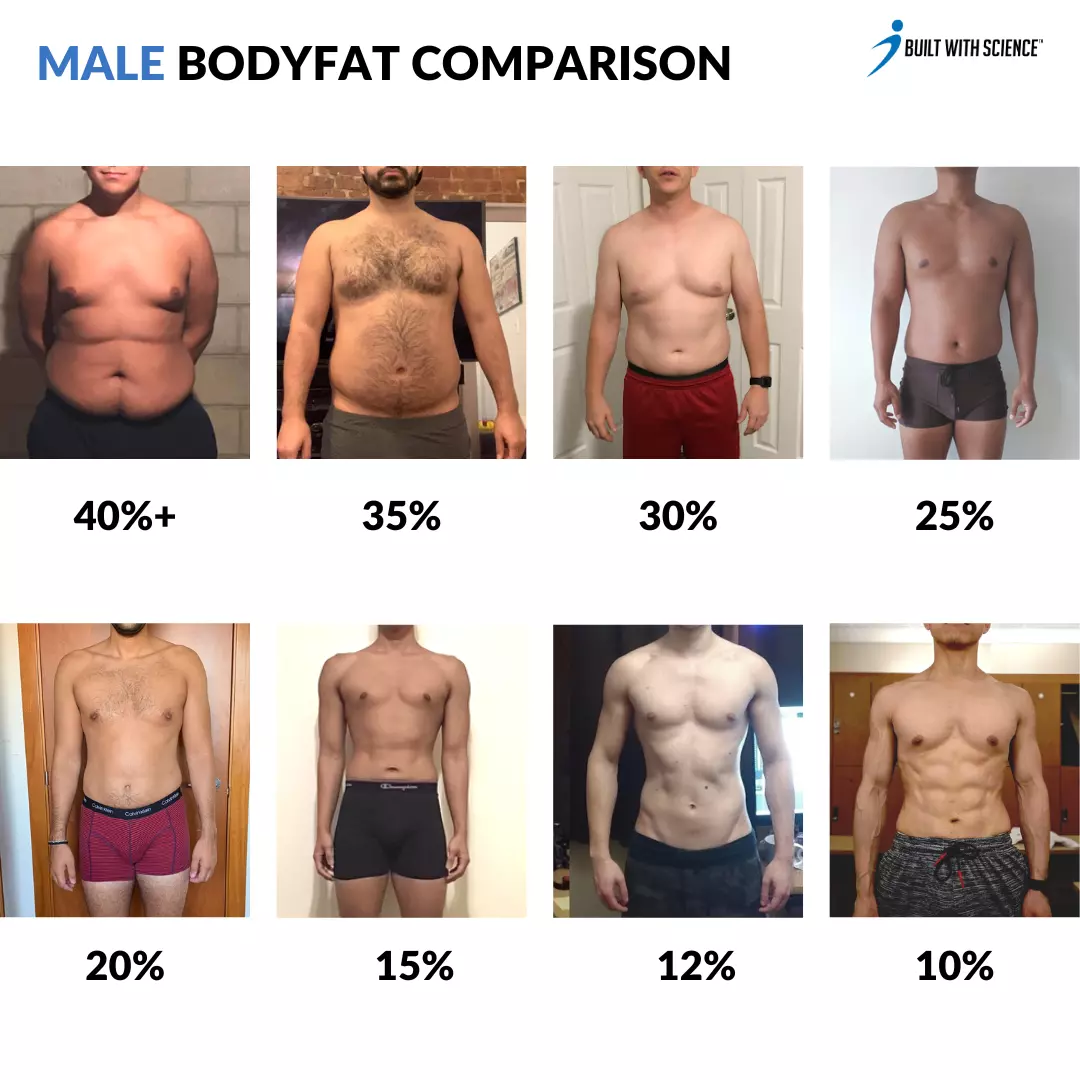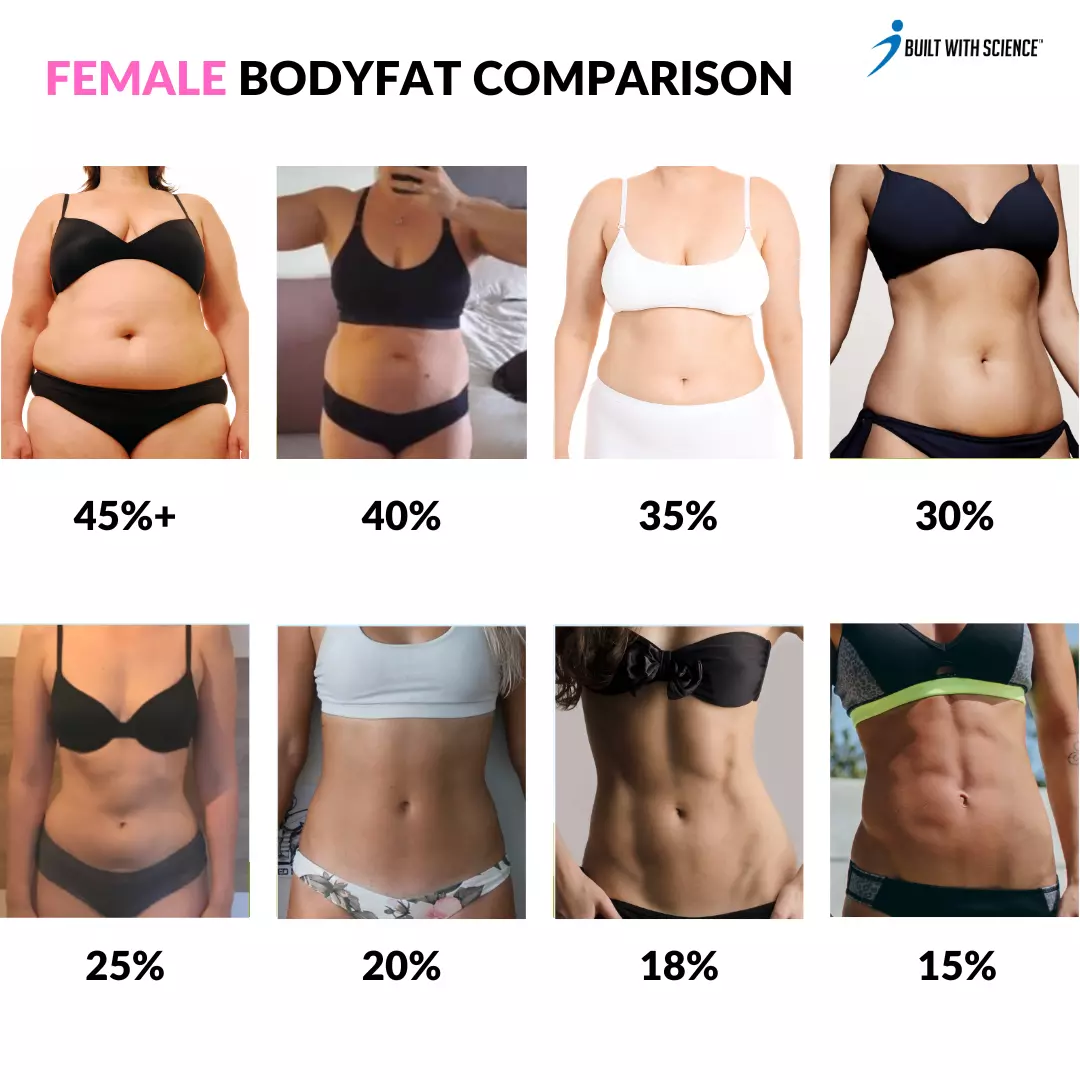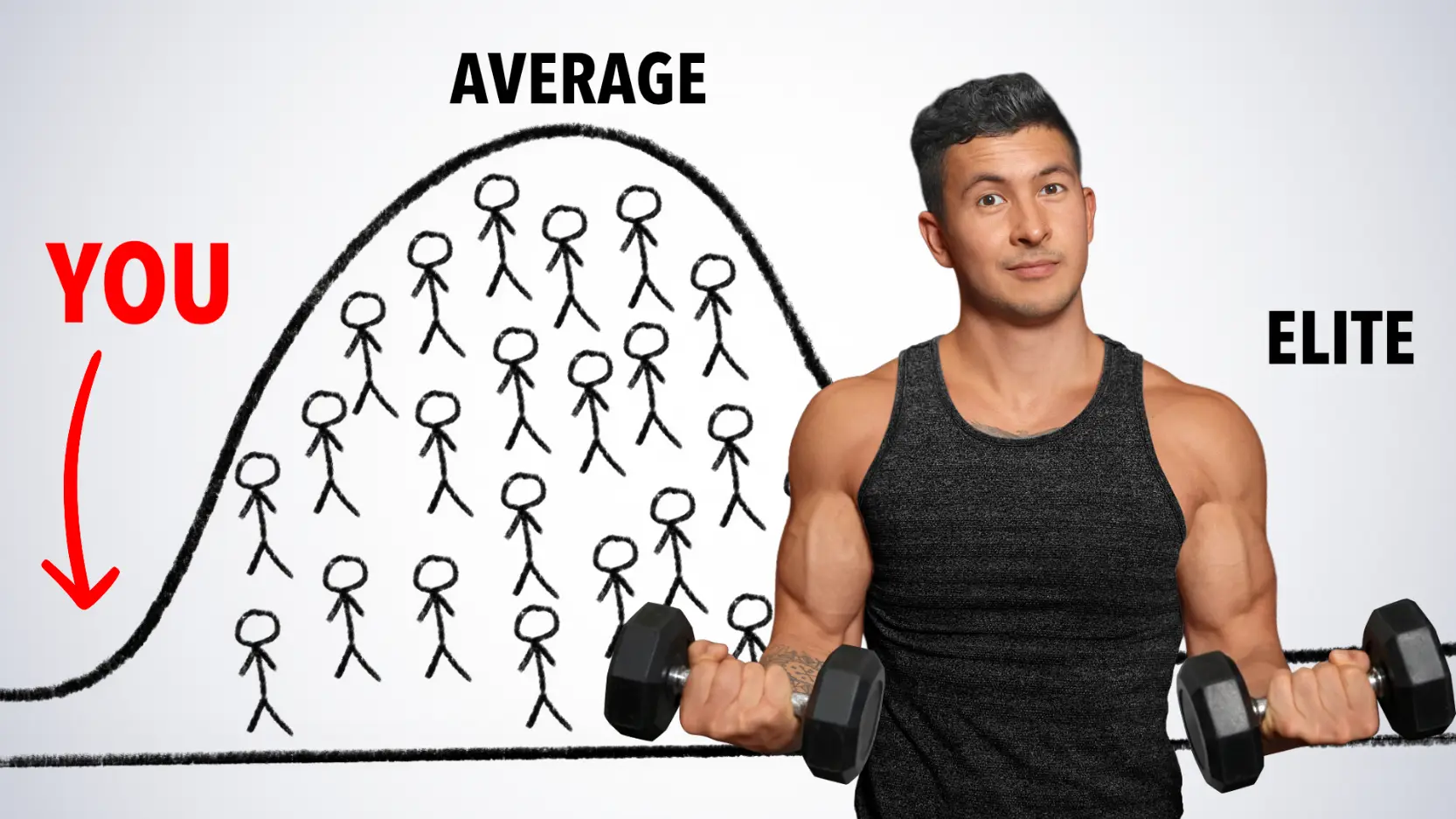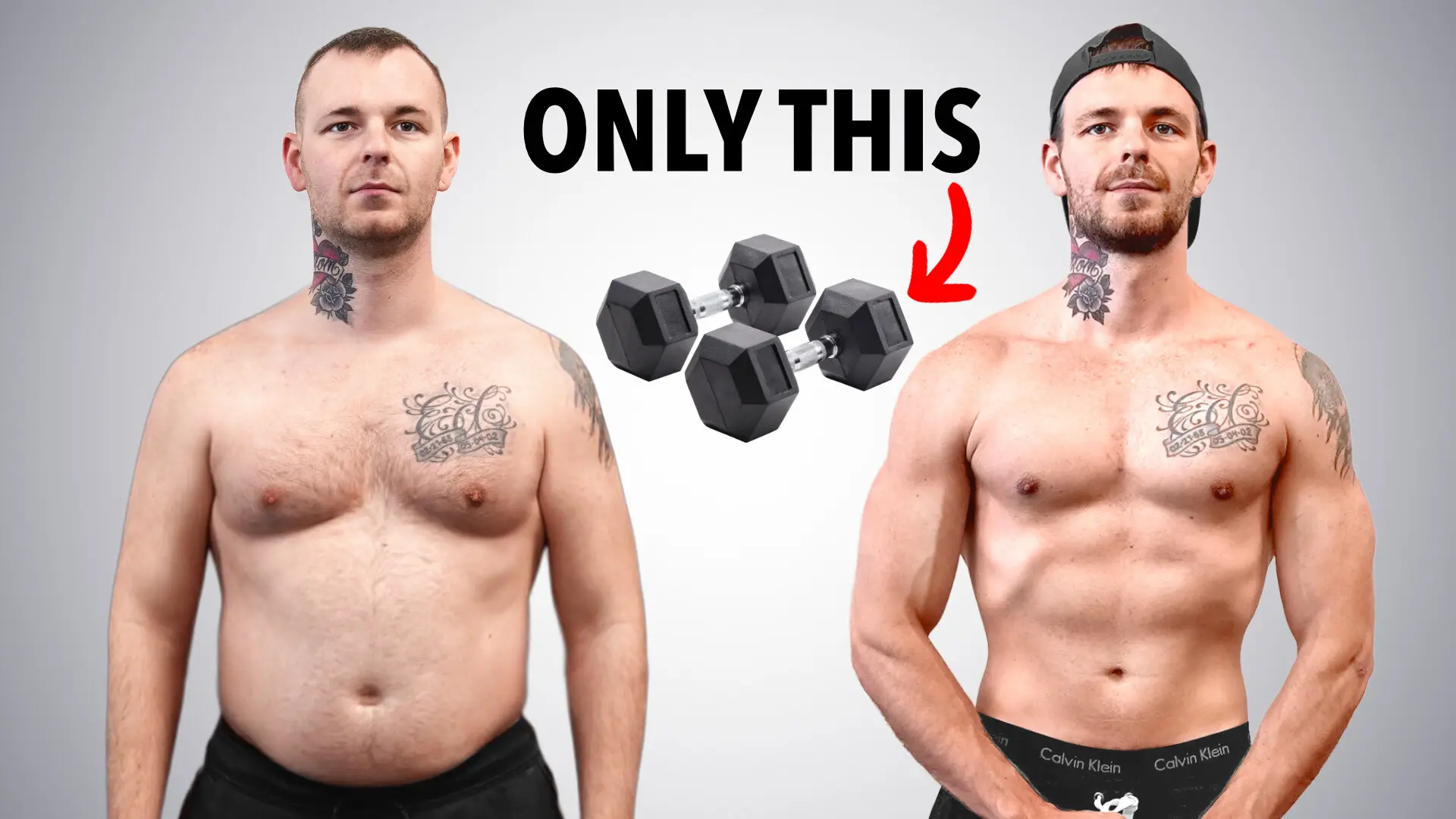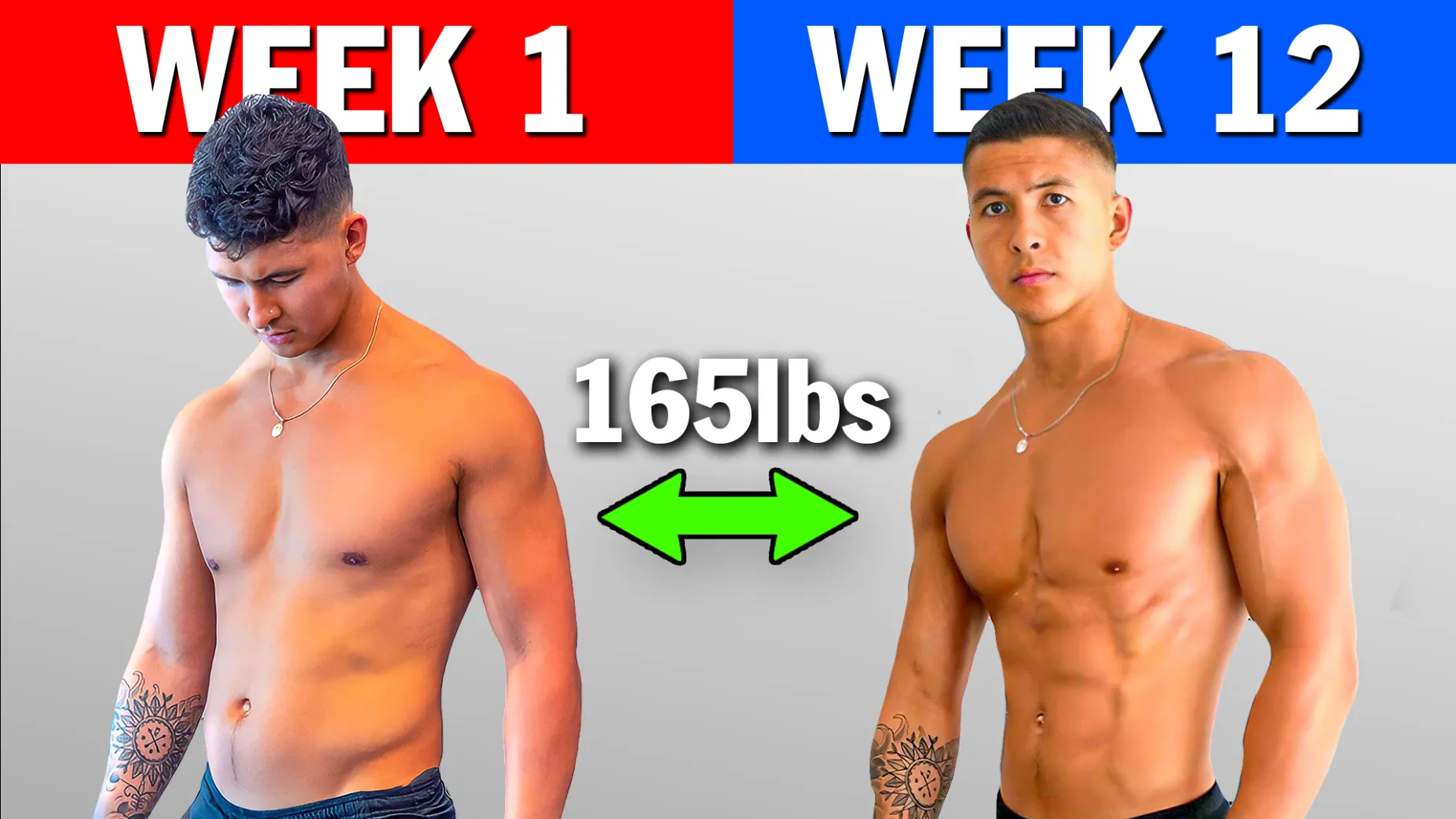
Body Recomposition Calculator: Build Muscle And Lose Fat
How To Build Muscle And Lose Fat At The Same Time (Body Recomposition)
Primary researcher for this article: Daniel Plotkin, PhD student
Discover the exact number of calories you need to eat to successfully achieve a body recomposition:
Click the button below to figure out how many calories you need to eat for body recomposition using our FREE calorie calculator:
↓
Body Recomposition Calculator
Build muscle. Lose fat. Pick 1.
Well, what if I want to do both at the same time? Known as “body recomposition”, many people believe this is impossible or only reserved for a small percentage of people. But that’s not entirely true.
Most people can definitely build muscle and lose fat at the same time.
In fact, it happens all the time in research, and not just in beginners.
This study found positive body recomposition in pro football players already squatting over 382 lb and benching over 289 lb).
And even some women at extreme levels of leanness preparing for a bodybuilding show have been found to gain a bit of muscle during this process.
So, what’s the secret?
Well, the major problem with trying to build muscle and lose fat at the same time is they’re 2 opposing goals.
Typically, you need to be in a calorie deficit to lose fat.
But because muscle building is such an energy-demanding process, this usually prevents you from building muscle.
However, the energy your muscles need to grow doesn’t just have to come from your diet.
With the right nutrition and training plan, you can actually signal your body to use its existing fat stores as energy towards building muscle, and as a result, build muscle and lose fat simultaneously.
So, how do we do it?
Well, there are 3 steps to this, starting with nutrition.
How To Eat For Body Recomposition
Calorie Deficit
The most important part of your nutrition is your calorie intake.
Although you’ll want to be in a calorie deficit to stimulate fat loss, the calorie deficit you use shouldn’t be as aggressive as it would be during a typical dieting phase.
As for what that sweet spot is, let’s take a look at this 2021 meta-analysis.
Researchers pooled together 59 fat loss studies to try to find at what point a calorie deficit becomes too low for building muscle to be possible.
Here’s the graph of the results.
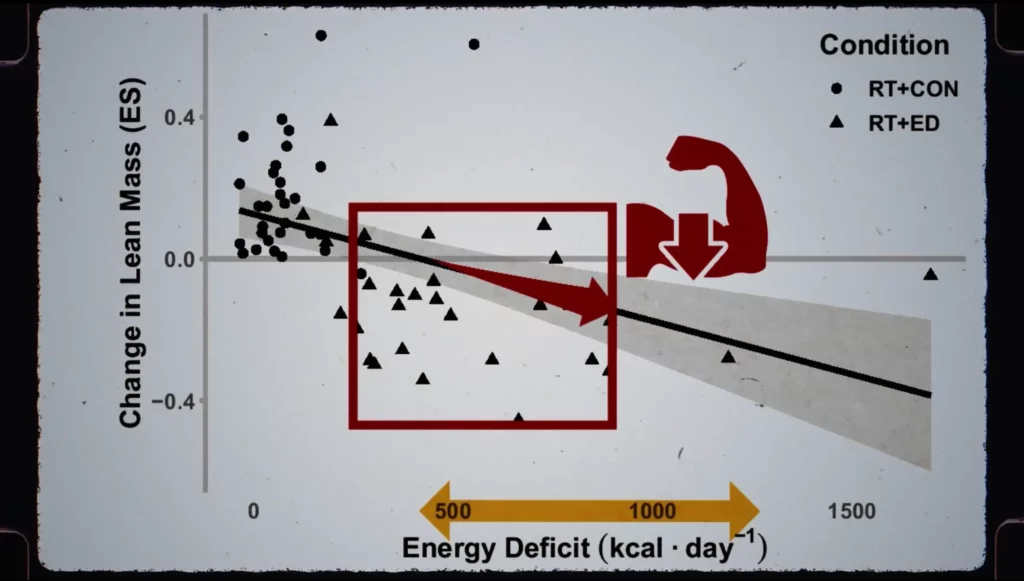
Notice how many people were able to build muscle when the deficit was small. But as soon as it surpassed a deficit of around 300 calories, muscle growth came to a halt and even began to decrease as soon as the deficit grew larger than 500 calories.
Now, keep in mind this data is from subjects following standard fitness programs employed in research studies, which usually aren’t the most ideal programs for muscle building.
So with the optimized training plan I’ll show you later, it’s very possible you’ll be able to build muscle even in a 500-calorie deficit and beyond.
However, based on this data, if you want to maximize your odds of being able to recomp, it’s likely that a slight deficit of around 200-300 calories is best.
Protein
Alright, so we have calories figured out, but what seems to be just as important is your protein intake.
This is because a calorie deficit reduces your rates of muscle protein synthesis, so less of the protein you eat will be used as a building block for building muscle.
Eat too little protein, and your body will start to look for it elsewhere, such as your existing muscle mass.
As for how much to eat to counteract this, let’s take a look at 3 studies.
Each of them had subjects eat in a calorie deficit but assigned them to either a low or high daily protein intake of different amounts (0.36g/lb BW vs 0.73g/lb BW, 0.55g/lb BW vs 1.1g/lb BW, and 0.45g/lb BW vs 1.05g/lb BW).
Every study found superior muscle growth in the high protein group, and since subjects were in a deficit, they managed to lose fat at the same time.
Unfortunately, we don't yet have a study comparing protein intakes that are both higher during a calorie deficit, such as 0.8g/lb BW vs 1.2g/lb BW.
However, I think it’s pretty safe to say that you will be pretty close to maximizing growth potential at about 0.8 g/lb BW.
And if you really want to be on the safe side, bump it up to 1 g/lb BW. By the way, these are the best sources of protein.
How To Train
So the next step is to pair your nutrition plan with a training plan designed to force your muscles to grow.
And there are a few relevant studies that can help us determine what the best approach might be.
One of them is a study published just last year, where researchers took 130 subjects with at least 6 months of training experience and compared the effects of having them train with heavy weights versus lighter weights while in a calorie deficit.
A common belief is that training with lighter weights for higher reps is better for fat loss, whereas training with heavier weights for fewer reps is better for building muscle.
But in this case, both approaches resulted in a similar amount of fat loss as well as a little bit of muscle gain.
Past research agrees with this, suggesting that both lighter weights and heavier weights can work.
But this does heavily depend on one factor: effort.
And this is honestly where I believe most of you guys are falling short.
You see, regardless of how heavy you’re lifting, in order to maximize growth, you need to take each of your sets at least within 3 reps short of failure.
And in fact, based on a new pre-print study, it might be advantageous to take each set even closer to failure than this (1-2 reps short of failure).
The thing is, most people don’t train anywhere close to hard enough to reach this.
And this brings me to an important point I want to make. There really isn’t a “special” body recomposition training plan.
It’s about doing the basics and doing them well:
- Push hard enough during each of your sets
- Train with enough volume (10-20 sets per major muscle weekly)
- Work each muscle at least twice weekly
- ... and most importantly, stay consistent!
Even if you’re an “experienced lifter”, fixing any 1 of these variables can very well be the stimulus your body needs to continue building muscle despite being in a deficit.
But before I cover who exactly body recomposition is best suited for, there is 1 more variable you need to make sure you don’t overlook. Sleep.
Sleep
So the most relevant study we have regarding sleep and body recomposition was published back in 2020.
Researchers took untrained men and randomly assigned them to either a workout program consisting of two full-body workouts per week, or that same workout program plus a sleep education program designed to improve both the quantity and the quality of their sleep.
After 10 weeks, both groups had similar increases in muscle with a trend favoring the sleep group.
When it came to fat loss, however, the sleep group lost significantly more fat (-1.8 kgs) while the workout-only group actually ended up gaining a little bit of fat (+0.8 kgs).
Other studies have shown similar effects where sleep deprivation negatively affects both muscle gains and fat loss.
So, to make sure you don’t sabotage all the work you put into your nutrition and training, try to get at least 7 hours of sleep per night.
Who Can Do Recomp?
Alright now that we’ve covered how to recomp, let’s discuss the most important part: who body recomposition is best suited for and whether or not it’s actually worth your time pursuing.
So first off, the higher your potential for growth, the more likely you’ll be to recomp.
And there are 3 main groups of people who satisfy these criteria.
The first group is beginners who can basically touch a weight and end up growing.
The second group has to do with the fact that muscle re-grows far easier than it took to initially grow it.
Laurence, one of our Built With Science members, is a good example of this. He took some time off training and in his first 2 months back, although his body weight didn’t change much, he was able to build some muscle while losing a good amount of fat.

But the third group is where I think most people fall under.
Nick, one of our Built With Science members, is a perfect example of this.
Although he had been training for several years, he was pretty much just going through the motions. He never properly applied progressive overload and had plenty of other areas where his training could improve.
He also didn't know how to approach his nutrition.
After we helped optimize his plan, he quickly saw results and experienced incredible body recomposition. Over the course of several months, although his actual body weight didn’t change too much, he clearly built a good amount of muscle while losing a ton of fat in the process.
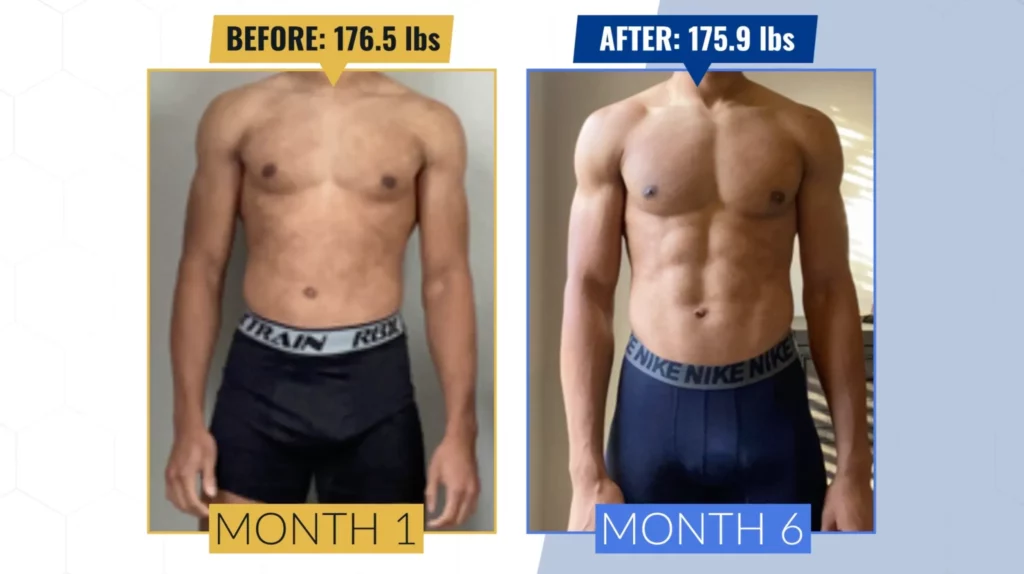
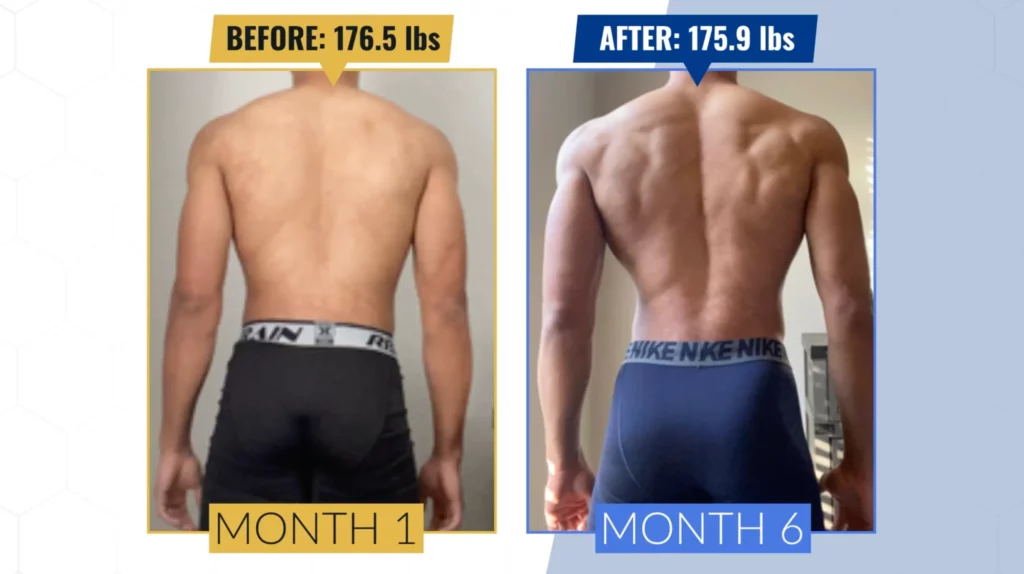
But even if you do fall into one of those groups, there’s still 1 more condition you should satisfy.
The importance of this is highlighted in a recent 2023 case study.
Researchers analyzed a group of professional bodybuilders during their contest prep and found as they got leaner, building muscle became far less likely.
And eventually, muscle loss became inevitable once they surpassed a certain level of leanness.
It is interesting however that a few of the female subjects were still able to build a little bit of muscle.
Another study has shown similar results and suggests that body recomposition may be more likely to occur in females even when relatively lean, but we definitely need more research.
So overall, although the exact minimum level of body fat required to recomp isn’t entirely clear, I’d say around 15% body fat for males and at least 22% for females is a good minimum.
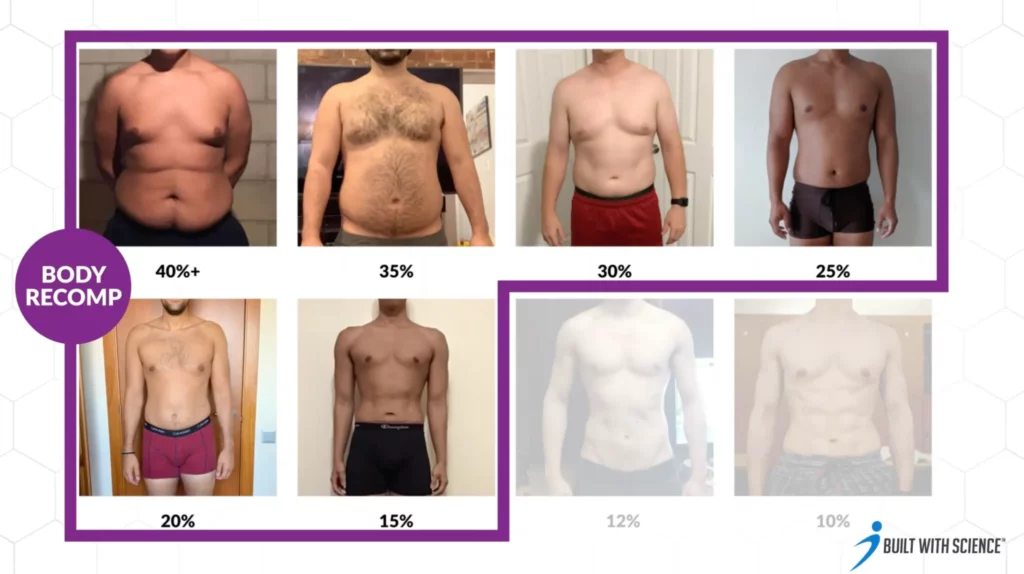
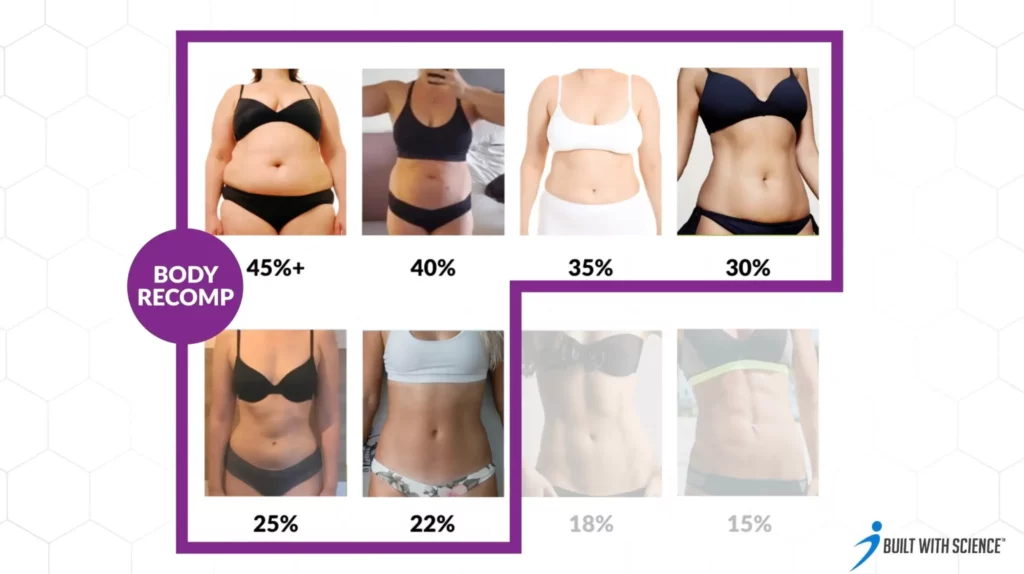
But again, it depends on the individual and how primed you are for building muscle.
Is Recomping Right For You?
But now that we’ve gone through the ideal candidates for a recomp, let’s discuss whether it’s actually worth your time.
First off, if you're someone who’s pretty lean or has been training both hard and consistently for at least 6 months, then you’re probably going to have a harder time trying to recomp.
Secondly, even if you are likely to recomp, you should also consider what your main goal is right now.
I know you want both, but what’s truly more important to you right now — building muscle or losing fat? For example, while you might end up building a little muscle during a recomp, most research suggests that a surplus or “lean bulk” is likely superior.
And if your main goal is to lose fat, then a slightly more aggressive deficit would definitely lead to more fat loss with the possibility that you’ll still be able to gain a bit of muscle.
It’s also likely no coincidence that no bodybuilder on the planet that I’m aware of, natural or enhanced, tries to recomp their way to muscle growth.
They use bulk and cut cycles and end up looking better year after year.
And perhaps just as important, we as humans like to see things go in the right direction. During a recomp, results can be slow, and your body weight doesn’t really help indicate whether things are going in the right direction.
So you’ll have to rely on other metrics like small differences in progress photos, strength in the gym, how your clothes are fitting, and tracking your waist circumference over time.
Without proper guidance, this can be a lot more difficult to navigate than a traditional bulk or cut where the scale and quicker body changes can lead the way.
That said, I do think for some people it’s worth a shot.
And as a recap, here’s who it’s best suited for, here’s how to execute it, and here’s what to expect and how long it typically lasts.
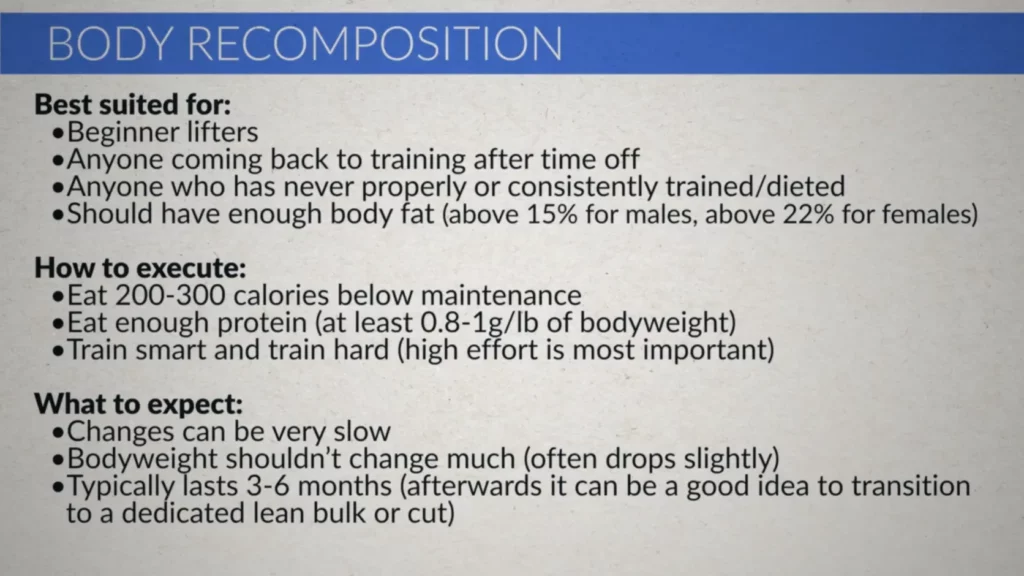
Just always remember that proper nutrition and hard, consistent training is what matters the most. Optimize that, and it’s very likely you’ll be able to recomp to some extent regardless of the exact approach you use.
And if you need some help optimizing your plan, then take our quiz below to find the best step-by-step training and nutrition plan for you and your body:
Click the button below to take my analysis quiz to discover the best program for you:
↓
Highly recommend giving this article a read next for a stretch-focused training technique shown to almost double your muscle growth that you can start applying today.
Thanks for sticking till the end, and I'll see ya next time!


